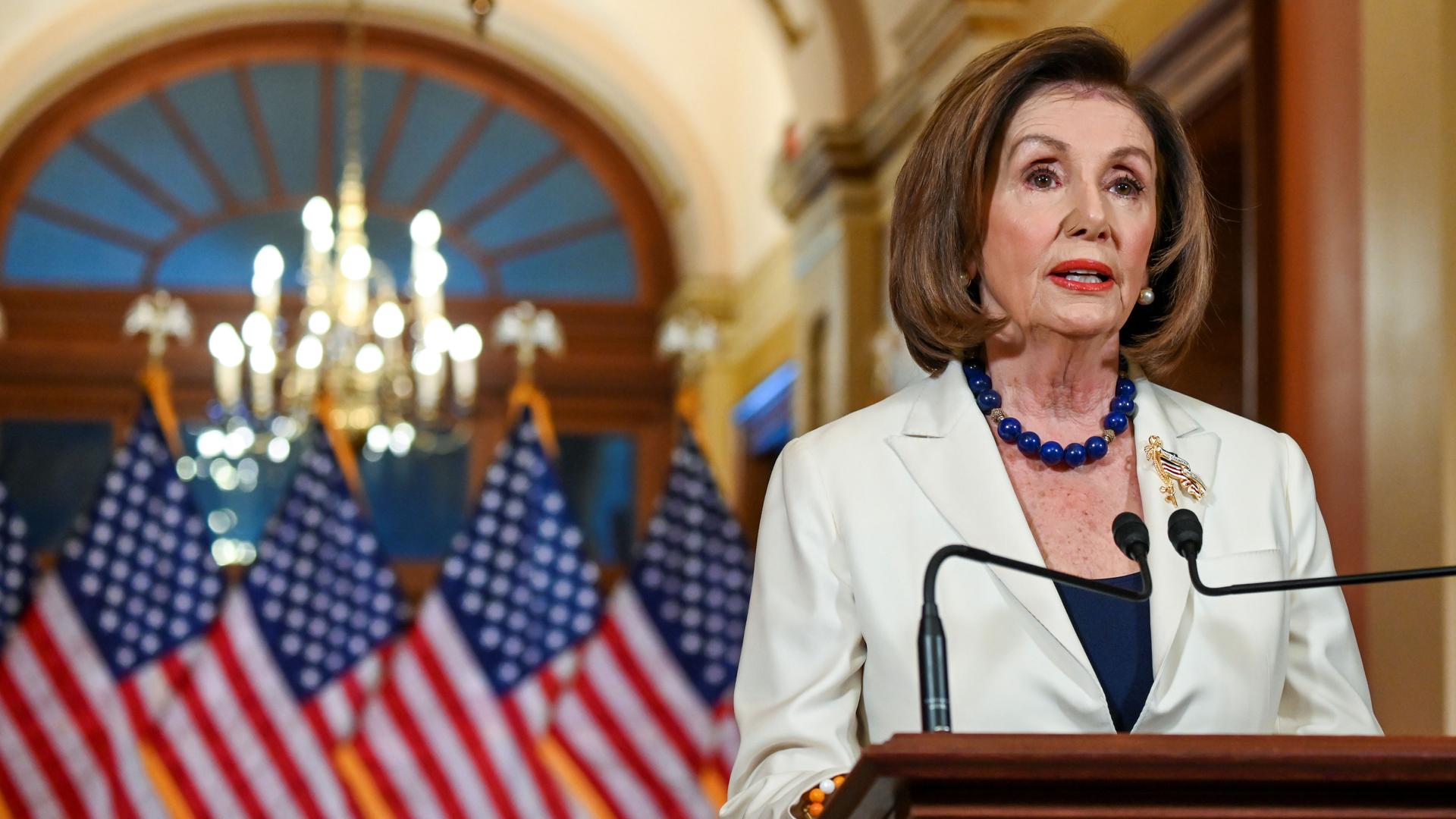Democrats push forward as Pelosi moves for articles of impeachment
US House Speaker Nancy Pelosi (D-CA) discusses the status of the impeachment inquiry into President Donald Trump on Capitol Hill in Washington, DC, Dec. 5, 2019.
Speaker Nancy Pelosi announced Thursday morning that the House of Representatives will proceed with articles of impeachment against US President Donald Trump.
“His actions are in defiance of the vision of our founders and the oath of office that he takes to preserve, protect and defend the constitution of the United States,” Pelosi said in a speech at the US Capitol. “Sadly, but with confidence and humility, with allegiance to our founders, and a heart full of love for America, today, I am asking our chairman to proceed with articles of impeachment.”
The House Judiciary panel could vote as early as next Thursday to recommend impeachment charges to the full House, Reuters reported.
Related: What’s happening in the impeachment inquiry: A timeline
Pelosi began her statement with the opening words of the Declaration of Independence, comparing the Founding Fathers’ grievances against King George III to “among other grievances [Trump’s] failure to faithfully execute the law.”
“In America, no one is above the law,” she added.
The House launched an impeachment inquiry in September, sparked by a whistleblower’s “urgent concern” that Trump was “using the power of his office to solicit interference from a foreign country in the 2020 US election.”
The Democratic-led House Intelligence Committee conducted a months-long investigation, including a public phase in which Americans heard sometimes damning testimony from career civil servants and Trump political appointees on the conduct of the president.
Related: In the impeachment inquiry, is the US a defender of democracy — or corrupt itself?
On Wednesday, the inquiry moved to the House Judiciary Committee, chaired by Jarrold Nadler (D-NY). The committee heard televised opinions on the threshold for impeachment from four legal scholars — the Constitution is broad in its definition of impeachable offenses, and the debate of experts in the hearing provides an on-the-record framework for any upcoming articles of impeachment.
Jonathan Turley, a professor at George Washington University who was called by Republicans to speak in the hearing, argued the investigation was “inadequate” and had been rushed.
“You set an incredibly short period, demand a huge amount of information, and when the president goes to court, you then impeach him,” Turley said, adding that the investigation amounted to an abuse of power. “You’re doing precisely what you are criticizing the president for doing.”
The three scholars called by House Democrats — Pamela Karlan of Stanford, Noah Feldman of Harvard and Michael Gerhardt of the University of North Carolina — indicated that the president’s actions as revealed in the investigation met the standard of impeachable offenses.
“The president solicited assistance from a foreign government in order to assist his own reelection,” Feldman said. “That is, he used the power of his office that no one else could possibly have used in order to gain personal advantage for himself, distorting the election. And that’s precisely what the framers anticipated.”
The legal scholars also noted concern over precedent.
“If you don’t impeach a president who has done what this president has done, then what you’re saying is, it’s fine to go ahead and do this again,” Karlan said.
Related: Susan Rice: US is ‘exporting instability and unpredictability’
In her Thursday statement, Pelosi said the framers, “specifically feared the prospect of a king-president, corrupted by foreign influence,” adding that the president’s actions violated public trust and “strikes at the very heart of our Constitution.”
“Our democracy is what is at stake,” Pelosi said. “He is trying to corrupt, once again, the election for his own benefit.”
Pelosi’s Thursday statements are another indication that the House hopes to vote on articles of impeachment before the December holidays. The upcoming 2020 election adds urgency to the timeline of the proceedings. One criticism against the inquiry has been that pushing an impeachment denies American voters the chance to determine the president so close to the next election.
Pelosi refuted that position in a November memo to Democratic colleagues: “The weak response to these hearings has been, “Let the election decide.” That dangerous position only adds to the urgency of our action, because the President is jeopardizing the integrity of the 2020 elections.”
However, once the impeachment moves to a trial in the Senate it is very likely that the president will not be removed from office. A two-thirds majority vote is required to convict and Republicans — who control the chamber with 53 seats — are likely to vote to acquit.
Related: Presidents aren’t immune to treason convictions. Just look to Ukraine.
Still, according to Vox, pushing the impeachment forward could also allow Democrats to move on to other issues, while appeasing their base’s demands to impeach the president and standing up for the rule of law.
Pelosi commended the committee chairs and members for the investigation and referenced both the law and divine providence in her closing statement Thursday.
“In signing the Declaration of Independence, our founders invoked a firm reliance on divine providence,” Pelosi said. “Democrats too are prayerful, and we will proceed in a manner worthy of our oath of office to support and defend the constitution of the United States from all enemies, foreign and domestic, so help us God.”
